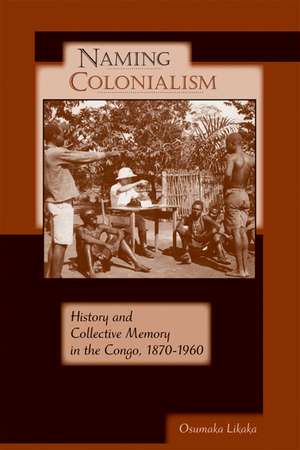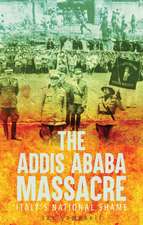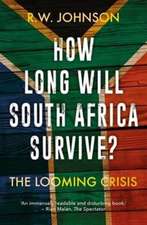Naming Colonialism: History and Collective Memory in the Congo, 1870–1960: Africa and the Diaspora: History, Politics, Culture
Autor Osumaka Likakaen Limba Engleză Paperback – 7 dec 2009
What’s in a name? As Osumaka Likaka argues in this illuminating study, the names that Congolese villagers gave to European colonizers reveal much about how Africans experienced and reacted to colonialism. The arrival of explorers, missionaries, administrators, and company agents allowed Africans to observe Westerners’ physical appearances, behavior, and cultural practices at close range—often resulting in subtle yet trenchant critiques. By naming Europeans, Africans turned a universal practice into a local mnemonic system, recording and preserving the village’s understanding of colonialism in the form of pithy verbal expressions that were easy to remember and transmit across localities, regions, and generations.
Methodologically innovative, Naming Colonialism advances a new approach that shows how a cultural process—the naming of Europeans—can provide a point of entry into economic and social histories. Drawing on archival documents and oral interviews, Likaka encounters and analyzes a welter of coded fragments. The vivid epithets Congolese gave to rubber company agents—“the home burner,” “Leopard,” “Beat, beat,” “The hippopotamus-hide whip”—clearly conveyed the violence that underpinned colonial extractive economies. Other names were subtler, hinting at derogatory meaning by way of riddles, metaphors, or symbols to which the Europeans were oblivious. Africans thus emerge from this study as autonomous actors whose capacity to observe, categorize, and evaluate reverses our usual optic, providing a critical window on Central African colonialism in its local and regional dimensions.
Methodologically innovative, Naming Colonialism advances a new approach that shows how a cultural process—the naming of Europeans—can provide a point of entry into economic and social histories. Drawing on archival documents and oral interviews, Likaka encounters and analyzes a welter of coded fragments. The vivid epithets Congolese gave to rubber company agents—“the home burner,” “Leopard,” “Beat, beat,” “The hippopotamus-hide whip”—clearly conveyed the violence that underpinned colonial extractive economies. Other names were subtler, hinting at derogatory meaning by way of riddles, metaphors, or symbols to which the Europeans were oblivious. Africans thus emerge from this study as autonomous actors whose capacity to observe, categorize, and evaluate reverses our usual optic, providing a critical window on Central African colonialism in its local and regional dimensions.
Din seria Africa and the Diaspora: History, Politics, Culture
-
 Preț: 164.51 lei
Preț: 164.51 lei -
 Preț: 165.36 lei
Preț: 165.36 lei -
 Preț: 507.02 lei
Preț: 507.02 lei -
 Preț: 216.96 lei
Preț: 216.96 lei -
 Preț: 258.96 lei
Preț: 258.96 lei -
 Preț: 241.28 lei
Preț: 241.28 lei -
 Preț: 235.42 lei
Preț: 235.42 lei -
 Preț: 319.98 lei
Preț: 319.98 lei -
 Preț: 427.26 lei
Preț: 427.26 lei -
 Preț: 240.43 lei
Preț: 240.43 lei - 15%
 Preț: 476.95 lei
Preț: 476.95 lei -
 Preț: 149.90 lei
Preț: 149.90 lei - 23%
 Preț: 476.07 lei
Preț: 476.07 lei -
 Preț: 505.08 lei
Preț: 505.08 lei -
 Preț: 539.68 lei
Preț: 539.68 lei -
 Preț: 205.29 lei
Preț: 205.29 lei -
 Preț: 265.45 lei
Preț: 265.45 lei - 23%
 Preț: 534.68 lei
Preț: 534.68 lei - 23%
 Preț: 475.06 lei
Preț: 475.06 lei - 23%
 Preț: 475.06 lei
Preț: 475.06 lei - 23%
 Preț: 471.92 lei
Preț: 471.92 lei - 23%
 Preț: 471.33 lei
Preț: 471.33 lei - 21%
 Preț: 343.29 lei
Preț: 343.29 lei - 19%
 Preț: 440.08 lei
Preț: 440.08 lei - 8%
 Preț: 529.23 lei
Preț: 529.23 lei
Preț: 172.75 lei
Nou
Puncte Express: 259
Preț estimativ în valută:
33.06€ • 34.60$ • 27.51£
33.06€ • 34.60$ • 27.51£
Carte tipărită la comandă
Livrare economică 31 martie-14 aprilie
Preluare comenzi: 021 569.72.76
Specificații
ISBN-13: 9780299233648
ISBN-10: 0299233642
Pagini: 216
Ilustrații: 3 b-w illus., 2 maps
Dimensiuni: 152 x 229 x 15 mm
Greutate: 0.32 kg
Ediția:1
Editura: University of Wisconsin Press
Colecția University of Wisconsin Press
Seria Africa and the Diaspora: History, Politics, Culture
ISBN-10: 0299233642
Pagini: 216
Ilustrații: 3 b-w illus., 2 maps
Dimensiuni: 152 x 229 x 15 mm
Greutate: 0.32 kg
Ediția:1
Editura: University of Wisconsin Press
Colecția University of Wisconsin Press
Seria Africa and the Diaspora: History, Politics, Culture
Recenzii
“This innovative work offers rare access to African perceptions and interpretations of colonialism. Based on thorough research and creative analysis, Likaka’s book will have widespread scholarly and classroom appeal.”—Thomas Spear, series editor and professor emeritus of African history at the University of Wisconsin–Madison
“Likaka’s work goes significantly beyond what we already know—that Africans were not passive victims of colonial exploitation—by providing many concrete examples of ways in which Congolese villagers negotiated the colonial experience. This book will be most helpful to those scholars who want deeper insight into the Central African colonial world and those who plan to explore naming practices as a research method.”—H-Net Humanities and Social Sciences, H-Africa
“[A]n innovative undertaking and, in its scope and interpretive ambitions, a pioneering contribution to writing African history ‘from below’”—Africa: The Journal of the International African Institute
“In the end, Naming Colonialism: History and Collective Momory in the Congo makes public nearly one hundred years of protests that were hidden in plain sight/cities, in ‘simple phrases and words’, which until recently were not considered valid historical documentation. By proving that naming was a form of agency, memory keeping, and historical making, Likaka redefines how and by whom history and memory are recorded and reconstructed. In short, he redefines the making and uses of the historical archive.”— Maria Eliza Hamilton Abegunde, Africa Today
“Osumaka Likaka’s book is methodologically significant. . . .his focus on naming provides a wonderfully effective device for delving into local experiences. His book tells a unique story about grassroots perceptions and community memory, in fluent and moving prose.”—Diana Jeater, The American Historical Review
“With this last opus, Osumaka Likaka has written a seductive piece that should interest scholars working on Congolese history, colonial and imperial studies, and oral memories.”—Mathilde Leduc-Grimaldi, The Historian
Notă biografică
Osumaka Likaka is associate professor of history at Wayne State University. He is author of Rural Society and Cotton in Colonial Zaire, also published by the University of Wisconsin Press.
Cuprins
List of Illustrations
Acknowledgments
Introduction: Naming and African Voices
1 The Dynamics of Naming in Precolonial Congo: An Overview
2 Colonialism and the Village World: Contexts to Naming
3 Naming, Colonialism, Making History, and Social Memories
4 Early Naming, Explorations, Trade, and Rubber Collection
5 Naming and Belgian Colonial Rule
6 Talking under One's Breath: Praise Names as Strategic Ambiguities
7 Confronting African Voices: Negotiations and Instrumentalization of Names
Conclusions
Sample of Names Used in This Work
Notes
Works Cited
Index
Acknowledgments
Introduction: Naming and African Voices
1 The Dynamics of Naming in Precolonial Congo: An Overview
2 Colonialism and the Village World: Contexts to Naming
3 Naming, Colonialism, Making History, and Social Memories
4 Early Naming, Explorations, Trade, and Rubber Collection
5 Naming and Belgian Colonial Rule
6 Talking under One's Breath: Praise Names as Strategic Ambiguities
7 Confronting African Voices: Negotiations and Instrumentalization of Names
Conclusions
Sample of Names Used in This Work
Notes
Works Cited
Index
Descriere
What’s in a name? As Osumaka Likaka argues in this illuminating study, the names that Congolese villagers gave to European colonizers reveal much about how Africans experienced and reacted to colonialism. The arrival of explorers, missionaries, administrators, and company agents allowed Africans to observe Westerners’ physical appearances, behavior, and cultural practices at close range—often resulting in subtle yet trenchant critiques. By naming Europeans, Africans turned a universal practice into a local mnemonic system, recording and preserving the village’s understanding of colonialism in the form of pithy verbal expressions that were easy to remember and transmit across localities, regions, and generations.







